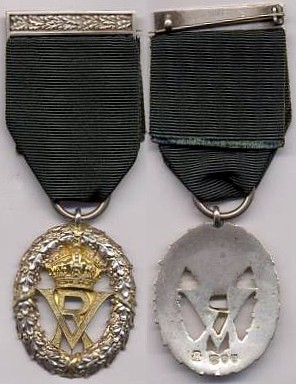Volunteer Officer's Decoration
| Volunteer Officers' Decoration | |
|---|---|

Queen Victoria version
|
|
| Awarded by the Monarch of the United Kingdom of Great Britain and Ireland, and Empress of India | |
| Country |
|
| Type | Military long service decoration |
| Eligibility | Officers of the Volunteer Force |
| Awarded for | Twenty years meritorious service |
| Status | Discontinued in the UK in 1908, in the Dependencies in 1930 |
| Post-nominals | VD |
| Statistics | |
| Established | 1892 |
| First awarded | 1892 |
| Last awarded | 1907 in the UK, 1930 in Bermuda |
| Order of wear | |
| Next (higher) | Army Emergency Reserve Decoration |
| Next (lower) | Volunteer Long Service Medal |
| Related | Volunteer Officers' Decoration for India and the Colonies |
|
Ribbon bar |
|
The Volunteer Officers' Decoration, post-nominal letters VD, was instituted in 1892 as an award for long and meritorious service by officers of the United Kingdom's Volunteer Force. Award of the decoration was discontinued in the United Kingdom when it was superseded by the Territorial Decoration in 1908, but it continued to be awarded in some Crown Dependencies until 1930.
The grant of the decoration was extended in 1894 by the institution of a separate new decoration, the Volunteer Officers' Decoration for India and the Colonies, that could be awarded to commissioned officers of all Volunteer Forces throughout the British Empire and India.
The Volunteer Officers' Decoration, post-nominal letters VD and colloquially known as the Volunteer Decoration, was instituted by Queen Victoria's Royal Warrant on 25 July 1892. The decoration could be awarded to efficient and thoroughly capable officers of proven capacity for long and meritorious service in the part-time Volunteer Force of the United Kingdom.
The qualifying period of service was twenty years. Half of any previous service in the Regular Army also counted towards qualification. The award did not confer any individual precedence, but entitled the recipient to use the post-nominal letters VD.
Recipients had to have been recommended for the award by the Commanding Officer of their Corps, and duly certified by the District Military Authorities in which the Corps was located as having been efficient and thoroughly capable officers, in every way deserving of such a decoration. In order to preserve the purity of the decoration, the name of any person on whom it had been conferred who was subsequently convicted of any act derogatory to his honour as an officer and gentleman, was immediately erased from the registry of individuals upon whom the decoration had been conferred.
The Volunteer Officers' Decoration could also be conferred upon any of the Princes of the Royal Family of Great Britain and Ireland.
On 24 May 1894 the grant of the decoration was extended by Royal Warrant to commissioned officers of Volunteer Forces throughout the British Empire, defined as being India, the Dominion of Canada, the Crown Colonies and the Crown Dependencies. A separate new decoration was instituted, the Volunteer Officers' Decoration for India and the Colonies. This decoration was similar in design to the Volunteer Officers' Decoration, but bore the Royal Cypher "VRI" (Victoria Regina Imperatrix) instead of "VR" (Victoria Regina).
...
Wikipedia
